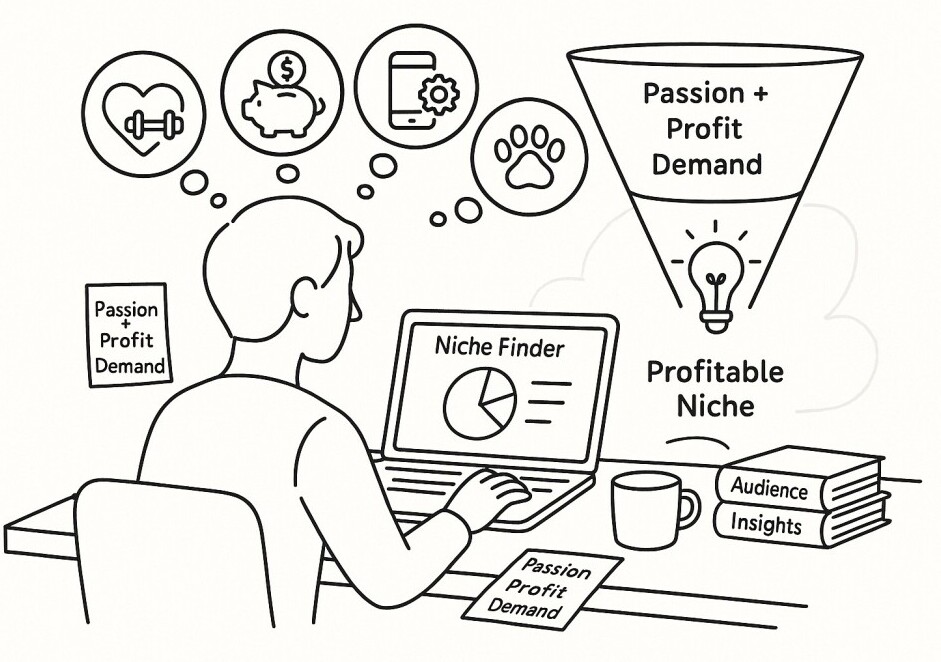Finding a profitable niche for affiliate marketing was one of the first big challenges I faced when getting started. The niche you select shapes what you’ll promote, who you’ll talk to, and ultimately how fast you see results. Making a thoughtful choice here lays a better foundation for your business as it grows.

Why Your Niche Matters for Affiliate Marketing Success
The affiliate marketing field is packed with opportunities, but not every niche pulls in the same kind of income. Focusing your efforts on a profitable niche connects you with buyers who have money to spend and who are actively searching for solutions online.
A smart choice often means your traffic converts at a higher rate and those visitors stick around longer. For instance, the global affiliate marketing industry is on the rise, with annual spending in the billions. Brands count on affiliates more and more, and there’s serious money to be made if you pick the right position. This shows how important finding the right niche is to capturing a slice of that revenue.
Your niche selection isn’t just about hobby interests. It directly affects your ability to attract visitors and make sales. The right niche sets the whole process in motion.
Core Elements of a Profitable Affiliate Niche
At first, choosing a niche can seem overwhelming, so I use a handful of key factors to help filter the choices:
- Buyer Intent: Are people in this niche ready to spend cash or are they mostly after free advice?
- Market Demand: Does the topic bring steady search volume and show genuine interest?
- Monetization Options: Are reputable affiliate programs out there, with decent payouts?
- Competition Level: Overcrowded niches can be tough for newcomers, while empty ones often signal little cash flow.
- Personal Interest or Skill: It’s easier to stick with and create great content when you’ve got some connection to the topic.
Balancing these factors alongside your strengths sets your website or channel in a solid direction and saves loads of time and effort as you build.
Jumping Into Niche Research for Affiliate Marketing
The research stage is your starting point. I begin by jotting down interests and backgrounds I have—everything from tech gadgets to animal care essentials. Then, I dig into current trends and market needs with tools such as:
- Google Trends: Puts a spotlight on whether a topic is gaining or losing public interest.
- Keyword Research Tools: Ubersuggest, Ahrefs, SEMrush, and Google Keyword Planner show search numbers and competition levels.
- Affiliate Networks: Platforms like Amazon Associates, ClickBank, ShareASale, and CJ Affiliate help you hunt for affiliate programs within various industries. This gives a peek at availability and which products have the best earning potential.
I start with a wide lens, then test out smaller, focused areas—what you might call subniches—within broader markets. For example, while “fitness” is wide, “HIIT home workouts for busy parents” drills down to a specific group with a stronger focus and less competition. That sweet spot between enough demand and not-too-much rivalry is where profits lie.
Quick Guide: Steps to Choose a Profitable Affiliate Niche
Here’s the step-by-step method that’s served me best for landing in the right niches:
- List Your Skills and Interests: Consider what you like exploring or have direct experience in.
- Analyze Trends: Google Trends and niche forums help you figure out if a topic is stable, fading, or exploding.
- Research Keywords: Find out how many people search for each keyword and how hard it is to stand out.
- Scout Affiliate Programs: Ensure there’s a good number of solid products or services to promote, and that the commissions make it worthwhile.
- Look at Competition: Search the main keywords in Google and see who’s dominating the search results. Smaller, newer blogs and channels mean more room for growth.
- Confirm Monetization Potential: Hunt for trending products, evergreen digital items, or recurring subscriptions you can pitch regularly.
By following through on these steps, you boost your chances of settling on a niche with strong long-term income potential and plenty of opportunities for you to build a name.
More Things to Think On Before Picking Your Niche
Grabbing a niche isn’t just about following the latest craze. People often fall short when they skip proper research. These are a few angles I always check before getting started:
- Passion and Sustainability: Is it a topic you’ll still like writing about six months down the line?
- Is it Seasonal? Some topics, like “Christmas gifts,” only pay off for short windows.
- Affiliate Program Trustworthiness: Even the hottest niches are no good if the affiliate programs don’t pay reliably or clearly spell out the rules.
- Physical or Digital Focus: Digital options often pay more per sale, while physical items can earn through volume.
Passion and Sustainability
I once picked a niche just for the high commissions, but my interest faded—and so did my site’s momentum. It’s always easier to stick with something if you’re genuinely curious about it. Your authenticity comes through in your work, giving your site a stronger voice and keeping your readers coming back.
Seasonality
Seasonal trends can bring big paydays, but most prefer stable, year-round topics to even out revenue. Personal finance, software tools, and health items usually see constant demand, which makes them reliable as ongoing sources of income.
Affiliate Program Reliability
Digging into each program’s track record is key. I always look for reviews, payout histories, and well-stated program details. Smooth, on-time payments are necessary—no one enjoys chasing after money they’ve earned.
Product Types: Digital vs. Physical
Digital products—think software or online courses—almost always pay heftier commissions, but physical products like gear or accessories can build up solid earnings through frequent purchases. I weigh both sides to see which is a better match for my business plans.
Making time for this background check has saved me from spinning my wheels in niches that ultimately weren’t sustainable or profitable.
Advanced Tips for Finding Even More Profitable Niches
When I got more confident with research, I branched out into more creative strategies to track down lucrative markets. Here’s what’s worked for me:
Zero in on Underserved Groups: Skip the main crowds and search for smaller audiences with very specific needs. For example, “eco-friendly insulation for tiny homes” targets a niche inside of a niche and comes with devoted buyers.
Check What’s Selling on Affiliate Networks: Most big networks list out their bestsellers by category. Filtering for these can put you in front of hot items before everyone jumps on board.
Hang Out in Online Communities: Reddit, Discord, and Facebook groups let you listen in on what people really need. Repetitive questions and pain points are perfect indicators of a profitable topic.
Dig into Related Field Trends: New niches often bubble up in adjacent industries, from health and tech to personal finance. Tools like Exploding Topics can highlight trends before they show up in the mainstream.
Training your eye to connect what people ask for with what affiliates can offer is a big edge. Pairing this approach with keyword analysis and competitor reviews gives me more options and keeps me ahead of big shifts in the affiliate space.
What Makes an Awesome Affiliate Niche? Examples from Real Life
Some niches are proven winners season after season. I’ve learned to look for spots where these factors overlap:
- High-ticket options (expensive gadgets, luxury items, or paid membership sites)
- Revenue that repeats (subscriptions or recurring commission setups)
- Steady demand all year long (health, money, and relationships rarely fall out of favor)
- Consistent search traffic (not just spikes and dips)
Here are a few real-life examples that many affiliates have seen great results from:
- Personal Finance & Investing: People always want budgeting apps, stock trading platforms, and credit card comparisons.
- Health & Wellness: Supplements, exercise routines, home gym gear, and wellness video courses are perennial favorites.
- Tech & Gadgets: Every release (phones, wearables, smart accessories) brings a new cycle of buyers hunting for advice and tools.
- Hobbies (Photography, DIY, Gaming): Whether it’s learning a craft or the newest controller, hobbyists are constantly looking to buy and learn.
Usually, I’ll target a niche within one of these bigger markets, like “meal kits for low-carb diets” instead of simply “meal kits.” Subniches make it easier to get known quicker and avoid direct fights with established websites and influencers.
Frequently Asked Questions
Question: Should I go broad or stick to a narrow niche?
Answer: Narrow is almost always easier for beginners. You build trust faster and can always branch out later if things go well.
Question: My niche is crowded—what now?
Answer: Look for trends inside that big market. There are always small sections and unique angles that larger sites ignore. Focus on serving a special group.
Question: Can I switch my niche after starting?
Answer: Absolutely, but changing directions too often means you lose authority and momentum. Pick something you’ll genuinely care about, and stick with it for at least a few months to see real growth.
Growing With Your Chosen Niche and Staying Adaptable
The affiliate scene moves quickly, and I’m constantly keeping an eye out for new products, changing commissions, and emerging market needs. Flexibility is critical because trends and opportunities appear and disappear all the time.
Tracking results, clicks, and conversions helps a ton. If a product isn’t resonating, I experiment with new keywords or switch up what I’m promoting. More often than not, these little adjustments make a noticeable difference in earnings.
The most profitable niche for you may not stand out immediately. Careful research, a dose of honesty when sizing up your own interests and skills, and a willingness to test the waters with new topics all build into lasting success. Stay curious, put your audience’s questions and needs first, and you’ll set yourself up for reliable income and continued growth in affiliate marketing.
All the best in all your affiliate marketing endeavors and have fun.
Dawn
Affiliate Marketer’s Edge
